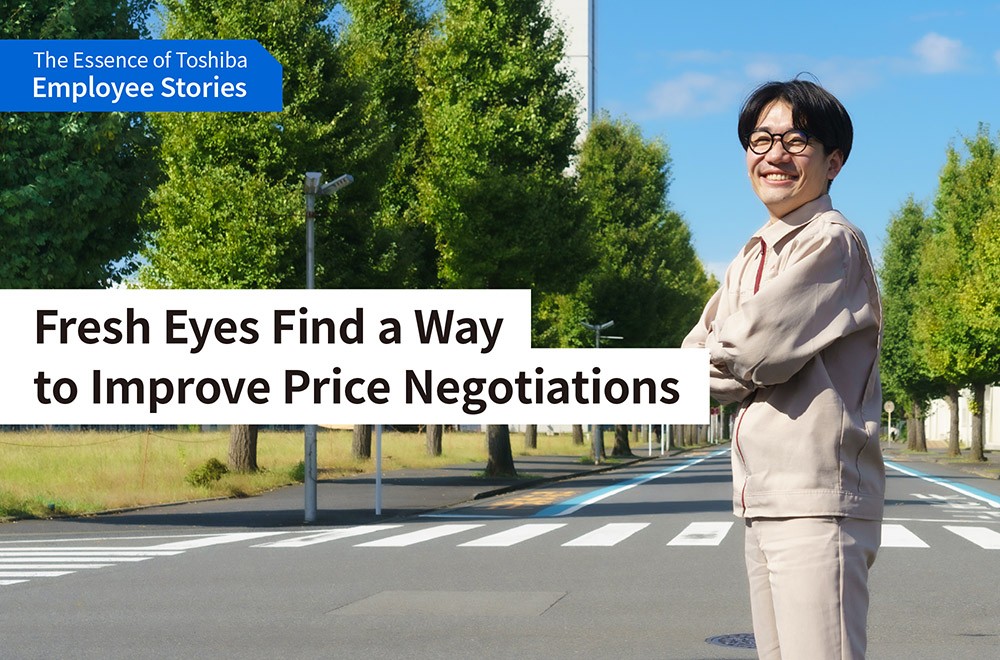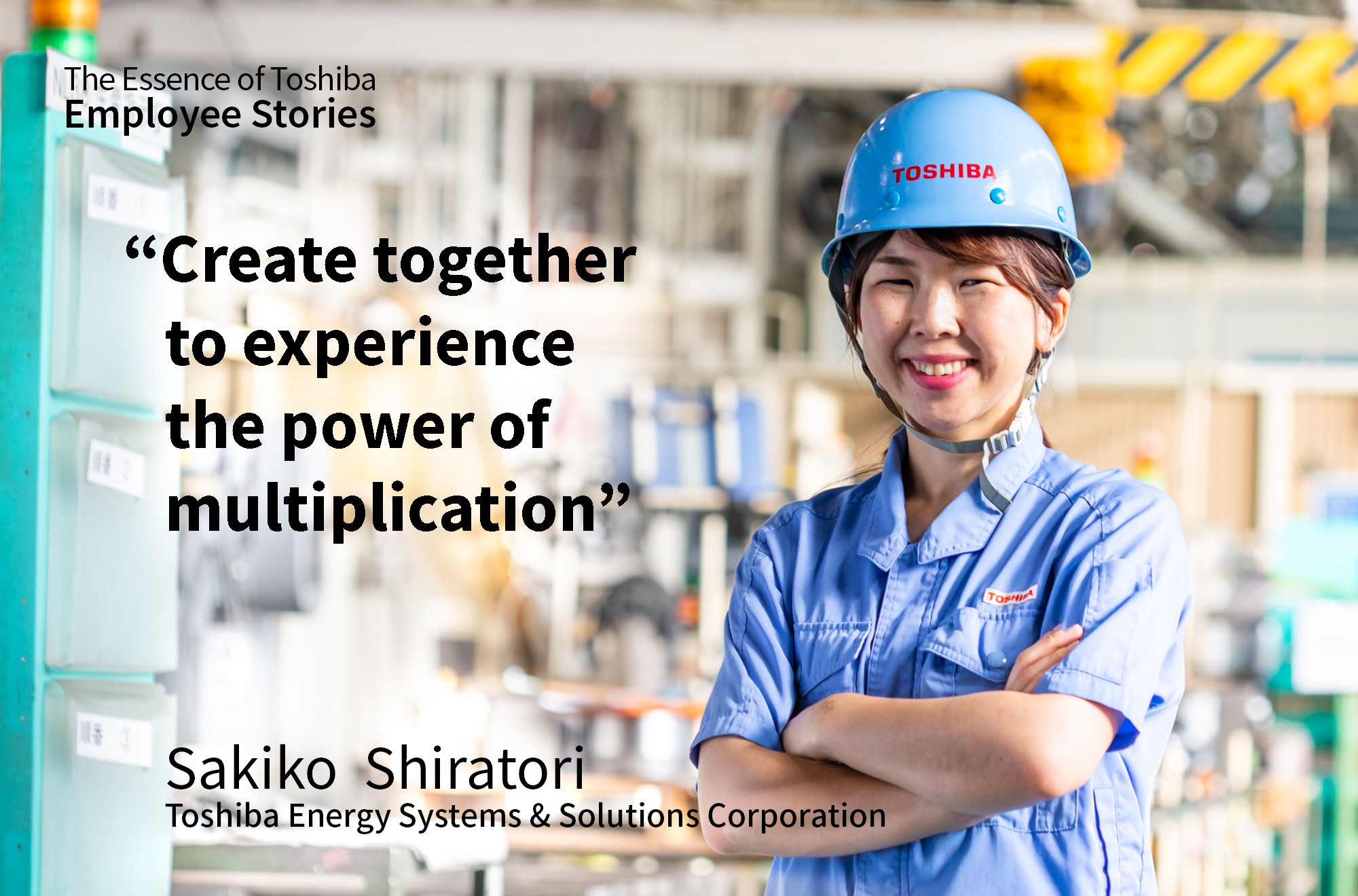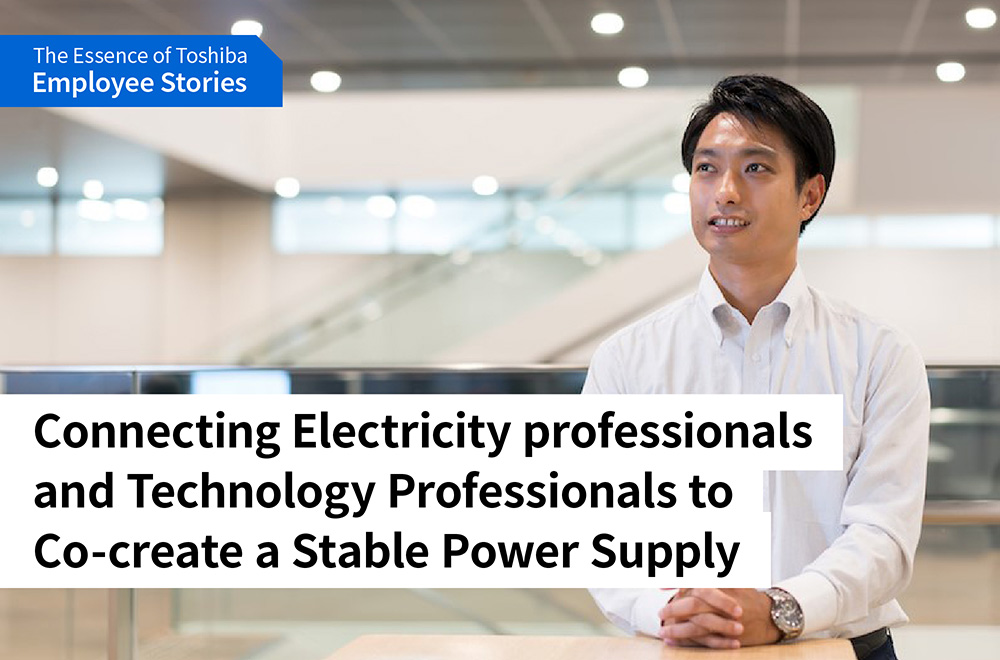We are Toshiba: “I want to contribute to livelihoods and economic development in India” -Creating the future of energy with passion and teamwork
2024/08/07 Toshiba Clip Team
- Support Indian livelihoods with energy, contribute to economic development guided by the “Three Realities Principle.”
- Respecting local culture and sharing goals leads to results.
- ’Passion and co-creation’ move things forward.
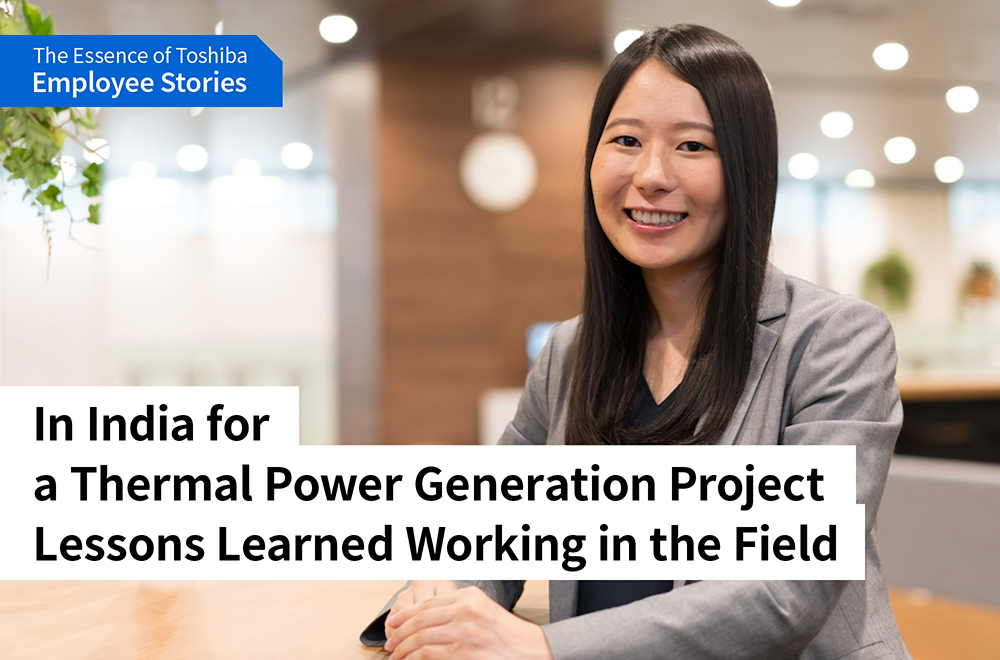
In every workplace we can find people who embody Toshiba’s management philosophy and who seek to create value. In their lives and work, they have realized their own values, and they have a clear desire to move forward. This Essence of Toshiba series explores the work and thoughts of Toshiba employees working around the world. In this issue we profile Kana Ogi. Following a stint at a subsidiary in India, she now works in overseas sales strategy, and she talks about insights she has gained on global co-creation, and her hopes for a fusion of values between Japan and India. What will unfold on the path she believes in and continues to pursue?
Involvement in the energy business started with a desire to “give back to India”
Toshiba’s involvement in India spans over half a century, and begins with the installation of power generation equipment at the Umiam Hydro Electric Power Station in northeast India in the early 1960s. More recent landmarks include the establishment of Toshiba India Pvt. Ltd. in 2001 and the 2008 establishment of Toshiba JSW Power Systems Private Limited as a base to manufacture steam turbines and generators, a strong support for essential infrastructure as India experiences remarkable economic growth.
Kana Ogi joined Toshiba in 2012. Only four years later, her lifelong dream of working abroad came to fruition, and she found herself in the dynamic land of India, a country where she had always wanted to work. As a sales representative at Toshiba JSW Power Systems Private Limited, she was responsible for internal and external coordination on the delivery of steam turbines and generators for Kudgi Super Thermal Power Station, a thermal power plant in, Karnataka state, South India, owned and operated by NTPC Limited, a government-owned company.
Explaining her wanderlust, Ogi says, “Ever since I was a child, I traveled abroad with my mom, and then I met a lot of people from different countries because of my dad’s hobby of playing in a band. When I was in high school, I did a homestay in the U.S. Naturally enough, I got the idea that I wanted to work internationally.”
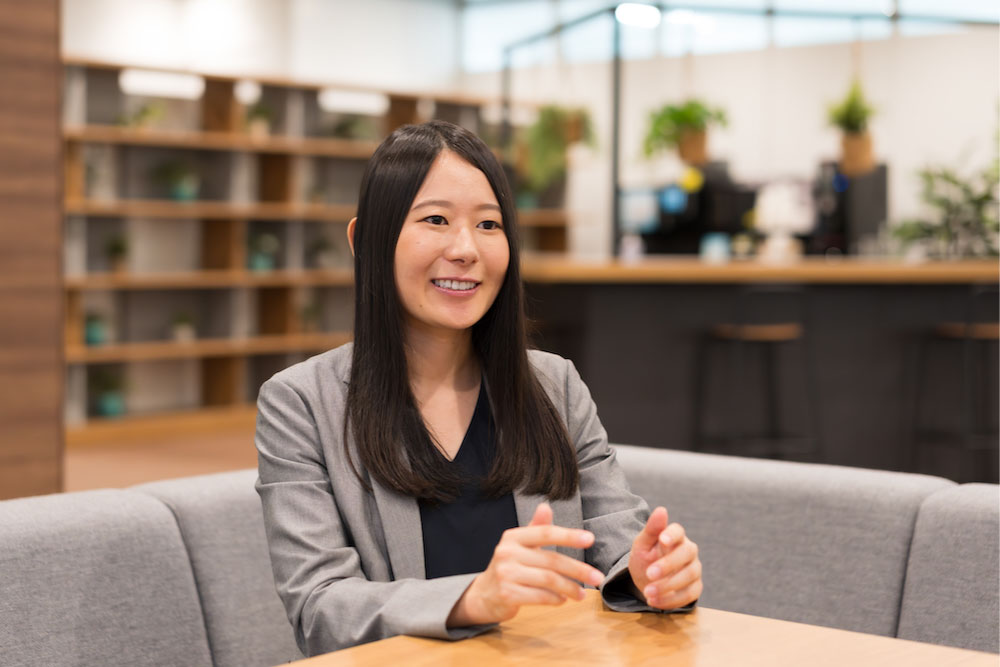
Ogi Kana, Business Strategy Group, Strategy Department, Global Marketing & Sales Div., Toshiba Energy Systems & Solutions Corporation
While studying international relations, Ogi became interested in India, then in the spotlight as one of the BRICS*1. As an undergraduate, she did a one-month homestay in India, and in graduate school, she studied India’s position in the international community. She also participated in the activities of the Japan-India Association, through which she met Narendra Modi, the Prime Minister of India, and India’s Ambassador to Japan. These contacts brought Ms. Ogi to India.
1: Brazil, Russia, India, China, and South Africa
“What I experienced in India was the depth of the people’s kind-heartedness,” she recalls. “The day before leaving my homestay family, I was crying because of the pain I was going through. My host father, even though he had to work hard and didn’t have a lot of time to spare, arranged for me to have one last time with my family. After I had returned to Japan, I was invited to a party at the Indian ambassador’s residence, where I was given the opportunity to say a few words of congratulations on the ambassador’s birthday, and to share my thoughts, which I did in Hindi and Japanese. The ambassador then said, in front of a lot of people, “Kana’s speech was very moving. I am sure she will be a bridge between India and Japan.”
“Both my host father and the Indian ambassador saw me as a real person, not just as a young student. If you open your heart to them, Indian people will treat you with every kindness. I had many memorable encounters and interactions that left me deeply impressed with their great warmth, and they strengthened my desire to contribute to Japan-India relations and, one day, to repay India.”
When considering a career path for after graduation, Ogi thoughts turned to people and how they live. Beyond that, from the economic perspective, she concluded that, “Energy is the foundation of a country’s development.”
In her own words: “Energy, I thought, that’s what supports people’s lives. That led me to look at Toshiba’s business in India, and I saw a focus on the energy business, including local subsidiaries and factories rooted in India. If I could be involved in that, I could support people’s lives and contribute to India’s economic development. I could also contribute to improving Japan’s international presence. With these thought in mind, I decided to join Toshiba.”
Sales is a clash of humanity against humanity. The “Three Realities Principle” led the way
Before her move to India, Ogi assisted in profit adjustment management for equipment shipped from Toshiba’s Japanese factory to India. As she herself says, “I wasn’t really sure how my work was connected to India.” It was only during initial sales training in India itself that she experienced San-gen-shugi, the “Three Realities Principle,” a method for understanding the workplace based on going there and seeing and understanding what is going on through actual place, thing and situation. Since then, she has emphasized the “Three Realities” in her work.
“Visiting the site let me see the actual power plant for myself, and communicate with customers and colleagues. And I could get a sense of where operations stood in the context of the overall business. It is really rewarding to be able to read the direction of the business, and to uncover issues that are not apparent in Japan and work to resolve them. I want to be able to touch, feel, and understand everything on-site—that is the starting point of my work.”
After the turning point of the training program, Ogi was assigned to an Indian subsidiary. She was immediately involved in a major project to deliver one of the largest steam turbines and generators in India to the Kudgi Super Thermal Power Station.
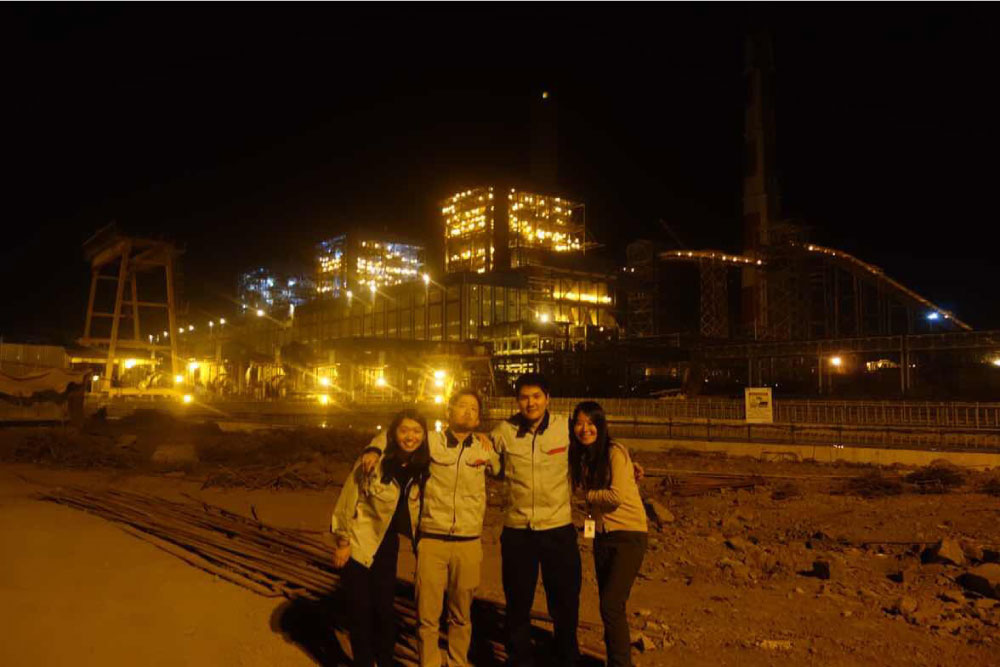
With young employees in front of the Kudgi site. Ms. Ogi is on the far right.
“In this project, Toshiba won a contract covering the design, manufacture, procurement, and installation of the turbines and generators. We had to get necessary approvals from the customer and meet the delivery schedule. In the middle of all this, Chennai, the home of the plant where the equipment is manufactured, was hit by once-in-a century flooding. All of a sudden, it was impossible to deliver two generators to Kudgi…
“With the delivery date looming over us, we racked our brains for a solution. With Japanese and local colleagues working together, we scrambled to deliver the repaired generators in the shortest possible time. What was there that I could do? As we all asked ourselves this question, I concentrated my efforts on coordinating and sharing information with all involved parties.
In a constantly changing situation, Ogi shared daily progress reports with the customer, covering the status of procurement, transportation, installation, and trial operation. She made sure to explain the progress made, remaining issues and solutions, all to gain their understanding.
“We were conscious of ‘sharing the goal’ with the customer,” she explains. “Even though we were in different positions and had different ways of thinking, we wanted to complete the power plant successfully, and ensure a stable supply of electricity. It was a shared goal. We confirmed our current position and search for solutions with respect to this goal through daily reports, which helped to create an atmosphere of ‘let’s work together as one, toward supplying electricity.’”
Everything Ogi did was grounded in a real desire to make sure the customer understood what was happening. “If your thoughts are conveyed to them, they will respond.” Ogi was sustained in this thinking by her homestay experience and participation in the Japan-India Association, and her firsthand experience of the depth of the kind-heartedness that is characteristic of India. Conscientious information sharing and sincere responses transcended cultures, and the project moved forward as one body.
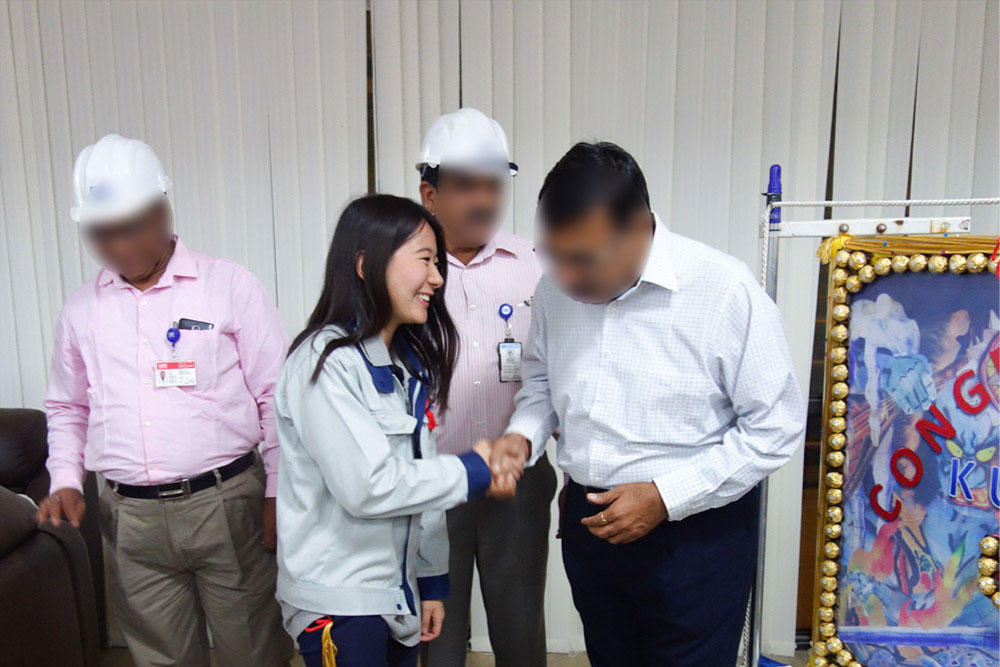
With the Director and executives of Kudgi Thermal Power Plant at the ceremony to mark the start of commercial operation.
“Indian people are always ready and willing to discuss things, and the assertiveness with which they express their ideas can be surprising,” says Ogi. “But if you open up to them, you will be amazed the sense of unity they show. At one point, delivery of the generators to Kudgi was in jeopardy, and we received some harsh comments from the customer. When all things were done, we shook hands with a smile. The customer even ran an article on our success in its in-house newsletter, saying ‘There was teamwork between us and Toshiba.’”
Ogi, who achieved such success with the Kudgi, has thoughts on the essence of sales.
“Salespeople don’t have the same expertise as technical people,” says Ogi. “But technology aside, everything else is sales. Even the way a project is handled depends on the way the sales process was approached. Of course, understanding the contract is a major requirement, but you also have to have a good understanding of the culture and language of the customer’s country, and communicate closely with them. A diplomat I met when I was in graduate school told me that the world of diplomacy is ‘a clash of humanity against humanity,’ and I have come to realize that the same can be said of sales.”
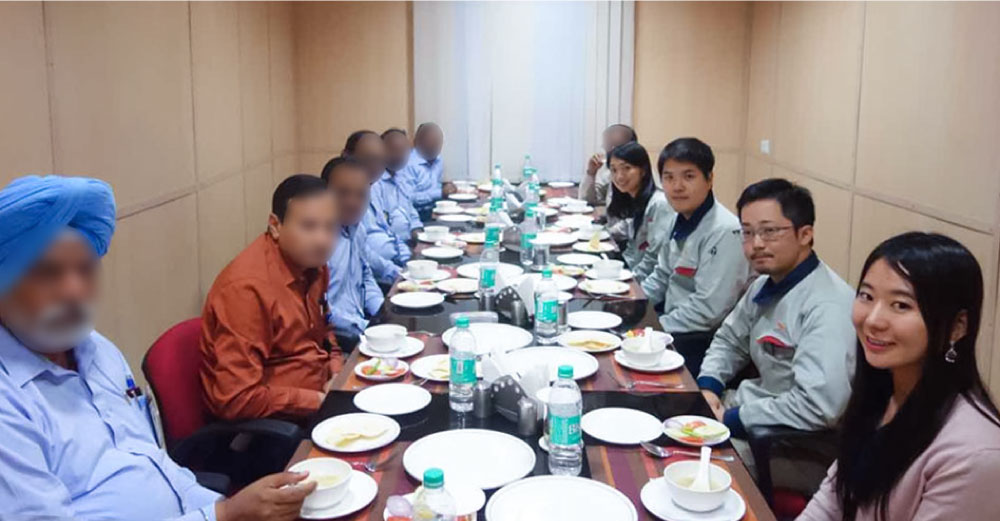
Ms. Ogi, first on the right, at a dinner meeting with the director and executives of the Kudgi Thermal Power Plant.
Her experience in India brought home to Ogi the need to respect and be aware of different cultures. It also helped her to understand how a global business can create value, and how to shape her approach to international business.
“Indian culture has a word, jugaad,” says Ogi. “It means even when things are difficult, create with what you have, look for solutions. Japanese are good at meticulously planning and executing things, but we also need to be flexible enough to see our way through when something unexpected happens. This is where jugaad is a source of strength. The Japanese characteristic of careful planning and execution, and the flexible responsiveness of India’s jugaad—at this increasingly complex and uncertain time, I feel that an Indo-Japanese fusion will become a powerful driving force.”
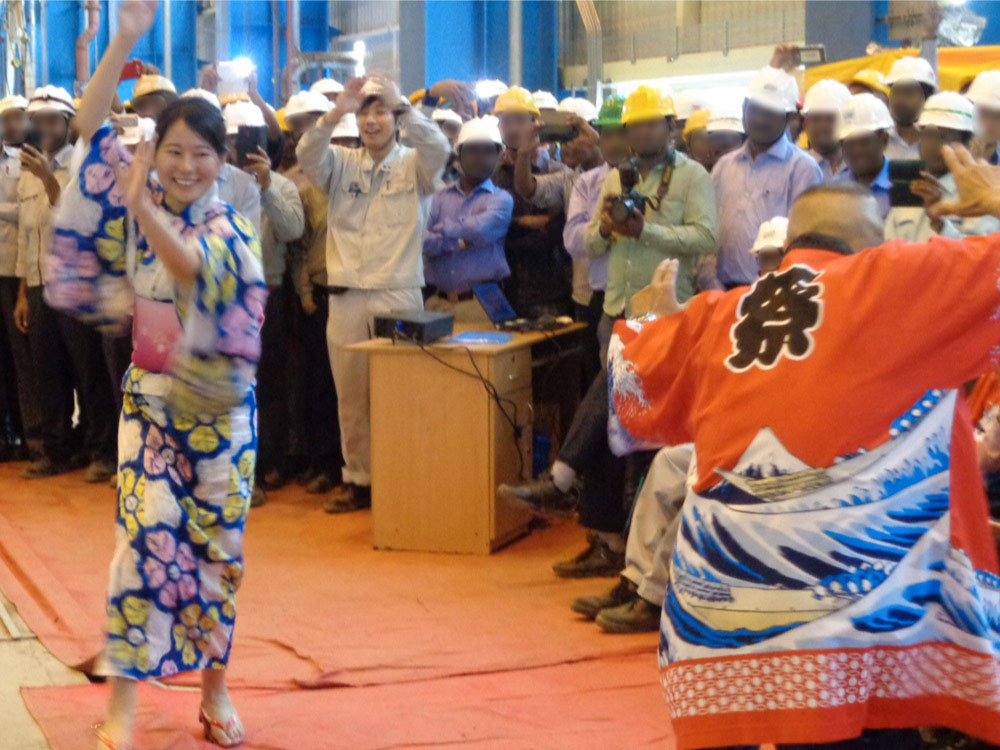
Ogi performs Awaodori, the dance of her home prefecture, Tokushima, on the power plant’s turbine generator operating floor.
Moving forward with work and family as a team. The understanding that comes with childbirth and raising a daughter
Ogi completed her assignment in India in 2018, and returned to Japan to take maternity and childcare leave. When she resumed work, she joined the Strategy Department of the Global Marketing & Sales Division, where she is responsible for oversight of the overseas energy business, as well as the establishment and operation of Next Kraftwerke Toshiba Corporation (TNK), a joint venture with a German startup. Ogi has also earned certification as a childcare advisor, and provides advice on this as a side job.
“While I really felt the joy of bringing new life into the world, I once saw taking time off for childbirth or childcare as a limitation on my career,” Ogi recalls. “However, once I was certified as a childcare instructor and gave some thought about how to deal with my family and childcare, I started to think about my work and child and family without separating them.
“When it comes to raising children, there are no right answers and no manual. We all search for what is best, and if things get difficult, we search for something better. Through all this the child grows, and so too does the parent. I came to feel that this was not a limitation, not at all, but something that increased my capacity as a person.”
During this time, Ogi was approached about visiting Paris on business. With a 3-year-old child, she thought an overseas business trip would be difficult. But her husband and daughter were understanding and even encouraged her to go.
“With the cooperation and understanding of my husband and daughter, we got through the 10-day trip. For us, it was a big confidence booster; we are a team, not only at work, but also the family. If something unexpected happens, or thing get difficult, we communicate well, and share goals to come up with a solution.
I share my career vision with my family. This will be useful for my daughter when she starts to work. As a family team, we are gradually gaining experience and building up our confidence. Through this, I believe we will get to the optimal work-life balance.
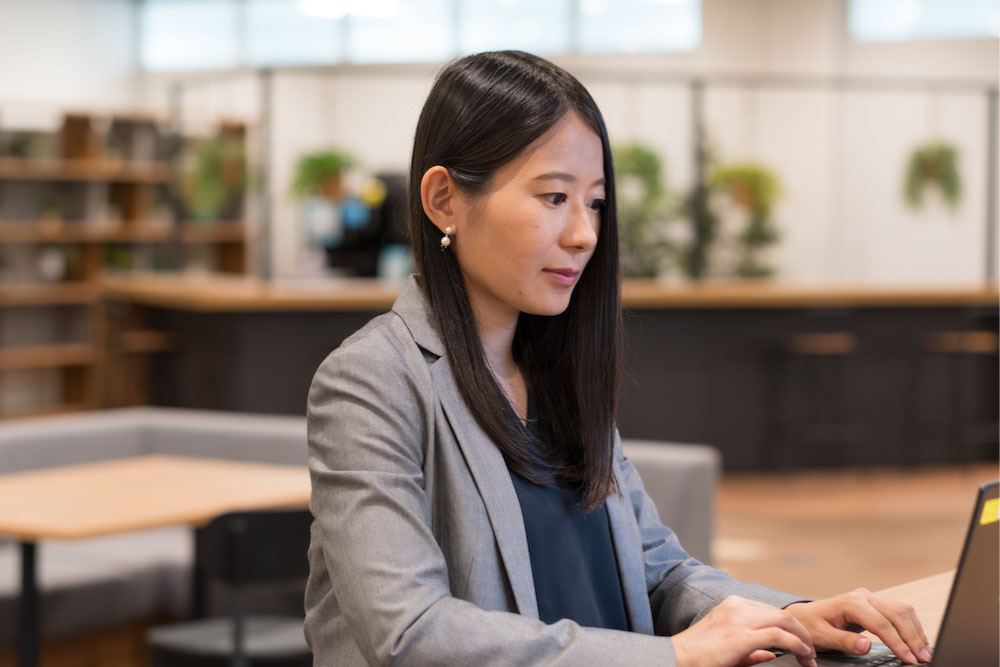
How do Ogi’s life experiences and the beliefs that she has cultivated mesh with Toshiba’s “Our Values”?
“I think ‘Look for a better way’ fits me best. I had a passionate desire to go to India, to see the actual site for myself and to create actual products with the people there, and that is why I could persuade my boss to let me go. Besides that, the word passion has been important to me since I was in graduate school. Passion is what keeps me going, and maintains my determination to get things done and I believe passion is associated with ‘Look for a better way’ in doing business.
“The time I spent in India also made me keenly aware of the importance of ‘Create together.’ We were able to do just that because the people at NTPC, Toshiba JSW Power Systems Private Limited, and the organizations in Japan worked together as one. Passion and co-creation–I am convinced that these two things will carry me forward.”
Ogi shares her career hopes and aspirations.
“When I joined Toshiba, it was because I wanted to be involved in the energy business and support people in their daily lives, and that has not changed. Now that carbon neutrality is a major issue, we need to think beyond the “HOW TO” of executing our existing business, and also consider “WHAT TO,” the actions to take as a global company. For myself, I hope that my experience in India, and the strategic vantage point of my current work, will make me a more mature version of myself, able to realize my hope of creating new business in India.”
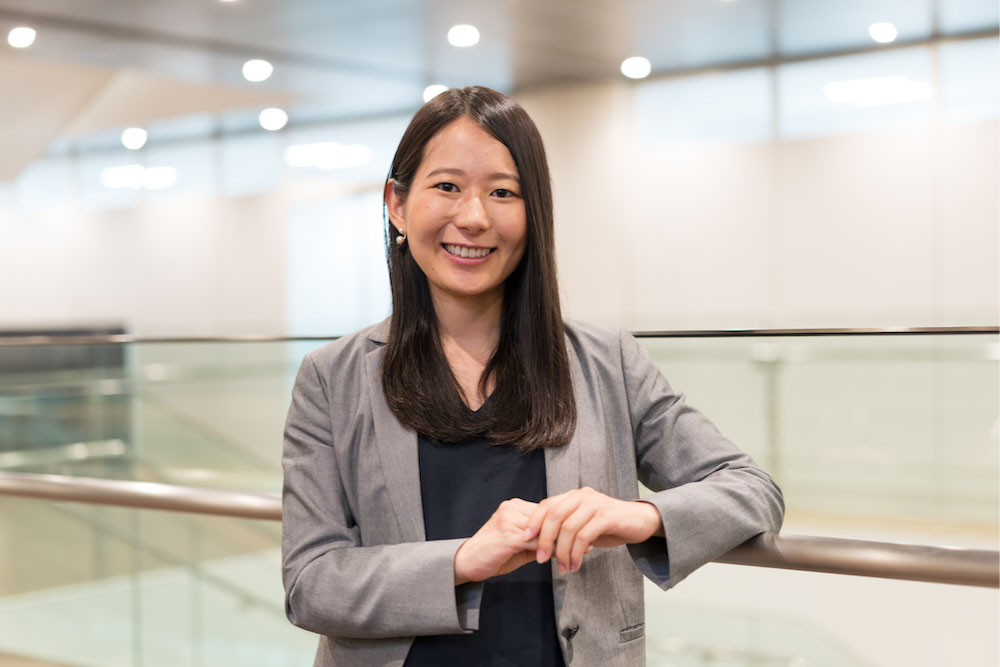
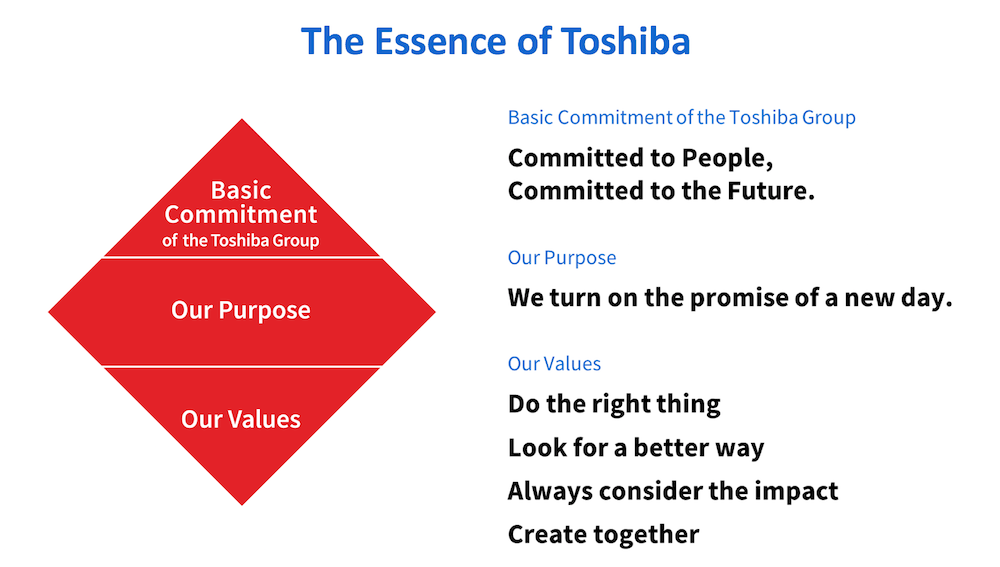
![]()





